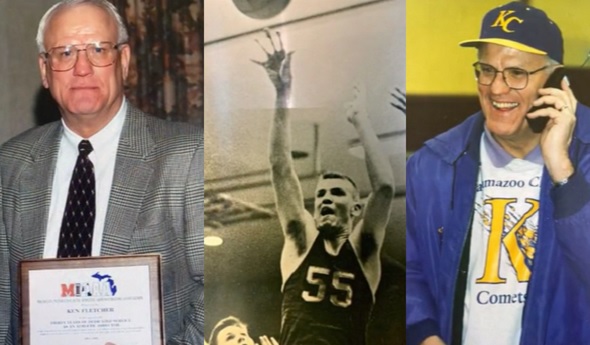
K-Christian's Fletcher Brought Calm, Kindness
October 13, 2020
By Geoff Kimmerly
Second Half editor
The calm in a storm. The rock, no matter how bad things would get.
That’s how longtime athletic administrator Karen Leinaar described Ken Fletcher, who served as director of Kalamazoo Christian’s athletic department for three decades and was among those from the Kalamazoo Valley Association who mentored Leinaar when she served at Delton Kellogg during the 1980s and 90s.
Fletcher died Sept. 25 at age 77.
He had spent 40 years total in education, also as a teacher and coach, before retiring in 2006.
“Anytime we had an issue in the league, he was the calming voice, he was the voice or reason,” said Leinaar, now athletic director at Bear Lake and executive director of the Michigan Interscholastic Athletic Administrators Association. “Being a mathematician, he was a very logical thinker – but he had the compassion of a priest.
“You never saw Ken disheveled. You never saw Ken frustrated. He always had a smile and kind word for everybody – it didn’t matter the color of their uniform or if it was an official or spectator.”
Fletcher had graduated from Kalamazoo Christian in 1961 and was part of the boys basketball team that won the Class C championship in 1959. He went on to Calvin College (now Calvin University), where he majored in mathematics and earned a degree in education, and also continued his basketball and baseball careers. He later received master’s degrees in in athletic administration from University of Michigan and mathematics from Western Michigan University.
Kalamazoo Christian’s boys basketball team also won Class C championships in 1983 and 2001 during Fletcher’s AD tenure. But Leinaar noted that Fletcher was a great advocate as well for the school’s girls programs, which often were more frequently successful – the softball team, for example, won six MHSAA Finals titles over seven seasons from 1996-2002. “He just loved kids,” she added.
Fletcher was named his region’s Athletic Director of the Year by the MIAAA in 1989.
He is survived in part by his wife of 56 years, Judy, three children and 14 grand- and great-grandchildren. Click to view Fletcher’s full obituary.
PHOTOS collected by the Fletcher family.

Thank Roosevelt for Football Weekends
December 20, 2013
By Rob Kaminski
MHSAA benchmarks editor
The next time you find yourself immersed in a tense crosstown football rivalry on a Friday night followed by a Saturday pilgrimage to the nearest college campus and a Sunday afternoon with a remote and your favorite snacks and beverages, take a moment to consider what the weekend would be like if it weren’t for Teddy Roosevelt.
The man who became our 26th President shortly after the turn of the 20th Century following the assassination of William McKinley in 1901 was a football fan like you. Maybe more so.
Today’s game of football has reached a critical crossroads. Player size and speed have increased across the board. Savage use of equipment as weapons rather than protective gear has been glorified on television networks and social media. Leaders of the game at all levels have recognized the need for change, employing new rules and widespread educational efforts to aid in preserving the sport.
History, as they say, is repeating itself.
In an ironic twist, it was Roosevelt who saved the then-brutally violent game of football from itself more than 100 years ago. Yes, the same “Rough and Ready Teddy” who led the charge up San Juan Hill during the Spanish-American War and often sparred in the boxing ring while in office from 1901-09 opined that football was becoming so gruesome that he delivered an ultimatum: clean up the game or it would be outlawed.
The Chicago Tribune reported that in 1904 alone, there were 18 football deaths and 159 serious injuries, mostly among prep school players. Football deaths suffered by younger players were reported on a nearly weekly basis, as outraged citizens called on colleges and high schools to banish football outright.
In stepped Roosevelt, who called head coaches and representatives from Harvard, Yale and Princeton – college powers at the time – to the White House in 1905 urging them to eliminate excessive violence and set an example of fair play for the rest of the country. When the casualties actually rose by one during the ensuing season, Roosevelt reacted with greater resolve and convened leading football authorities for the purpose of authoring drastic rules changes. What emerged was an intercollegiate conference which was the predecessor of the NCAA.
Among the most effective changes for the 1906 season were the legalization of the forward pass, the elimination of mass formations, and the creation of a neutral zone. Football fatalities fell to 11 in each of the next two seasons, and severe injuries fell drastically.
Thanks to the introduction of protective equipment and ever-evolving rules changes, football during the 100-plus years to follow has become an exponentially safer game. Yet, the game’s leaders always will need to adjust and react to scrutiny that comes with the territory.
So, as the game once again undergoes rules modifications in the name of safety, give a tip of the cap to President Roosevelt while you enjoy college bowl season and the NFL playoffs and begin to think ahead to the first high school practice of 2014.

